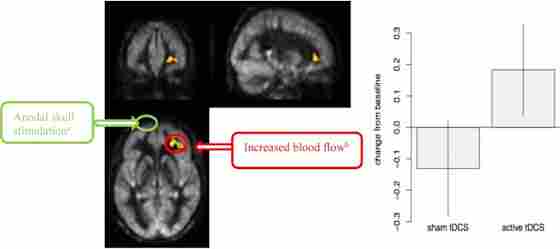Overview
Prior research has provided evidence, through consistent data, that cognitive training may be one of the most promising interventions currently available to impact the progression of MCI.In this clinical trial, adults with mild cognitive impairment (MCI) completed eight SMART™ cognitive training sessions across four weeks. Participants were split into two groups, and either received anodal tDCS (a-tDCS) or sham tDCS (s-tDCS) as a measure of regional cerebral blood flow (CBF). Cognitive gains were shown in executive function, conceptual reasoning, and episodic memory only in the s-tDCS group, suggesting that there is room to further study the effect of a-tDCS on cognitive attenuation.
Cerebral blood flow (CBF) voxel-based analysis for the interaction contrast, superimposed on average CBF map of all participants. Right middle frontal cortex (MFC) was significant at a cluster p-value = 0.05 (k = 1,168 mm3). Representation of the anodal stimulation site (green circle) and increased CBF. We illustrate the contralateral nature of the anodal stimulation from the CBF changes. (A) Anodal skull stimulation over left inferior frontal gyrus (IFG) for a total 8 sessions for 20 min prior to cognitive training over 4-week period. (B) Increased blood flow in right MFC after completing cognitive training sessions(T2-T1).






